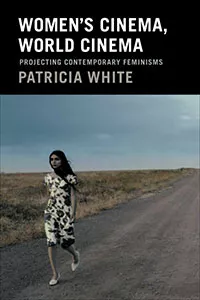Film & Media Studies Professor Patricia White Explores Global Women's Filmmaking in New Book

Professor and Chair of Film and Media Studies Patricia White explores the intersection of feminism and film in the 21st century in her new book, Women's Cinema, World Cinema: Projecting Contemporary Feminisms.
In the book, published last month by Duke University Press, White takes a global look at women's filmmaking, highlighting the work of a new generation of young directors who have come to prominence in the international film festival network. These directors include Lucrecia Martel (Argentina), Samira Makmalbaf (Iran), Nadine Labaki (Lebanon), Zero Chou (Taiwan), Jasmila Zbanic (Bosnia), and Claudia Llosa (Peru). In writing about their work, she also explores how gendered concepts of taste, authenticity, genre, national and sexual identity, and human rights shape reception of the directors' images and their reputations as auteurs.
"My book is really about what kinds of stories get told by and about women directors – what kinds of scripts they get cast into and then go on to rewrite," says White, who joined the Swarthmore faculty in 1994.
White says she was initially interested in learning how the feminist culture of media activism, production, and scholarship that emerged in the 1970s had influenced these young directors, most of whose films have been released since 2000. "I started writing this book because I was excited by the fresh women's voices from all over the world that were showing up in film festivals and art houses," she says. "They were telling a different story than what was happening in the U.S."
White argues that the globalized network of film festivals has enabled young women directors to make and circulate films that challenge both the aesthetics and politics of art house cinema and feminist genealogies.
"There have been prominent women directors in national cinemas for decades outside the U.S., but it wasn't until younger directors began winning prizes that the transnational phenomenon attracted attention," she says.
White saw similar stories of young women directors from many different places whose careers were being nurtured by changes in film funding, distribution, and criticism, but noted that "each of these stories drew on particular local and national histories and definitions of gender politics. The book became a comparative study of what gets lost by putting very different films and directors together, as well as what kinds of connections can be made among them."
In researching the book, White spent several years studying regional and national film industries. Her journey took her to film festivals and symposia in South Korea, Japan, Australia, and Mexico, where she was the invited guest of film programmer Mara Fortes '03.
Throughout the book, White brings out what is unique in each success story. In Lebanon, Nadine Labaki has emerged as the country's most prominent director by focusing on women's stories in the context of a history of conflict. In Taiwan, Zero Chou has made lesbian love stories that appeal to youth audiences at home and LGBT audiences abroad. White found thriving women's film culture in some unexpected places, such as Indonesia and Iran, where there is a higher percentage of female directors than there is in the U.S. industry.
"In many national cinema contexts, women can be thought of as a more authentic cultural voice," White says. "Directors take advantage of this to make their own political and aesthetic statements."
White is on the board of the feminist media arts organization Women Make Movies. The fourth edition of the popular introductory film textbook The Film Experience, which she co-authored with Timothy Corrigan, has also just been published by Bedford St. Martins' Press.



